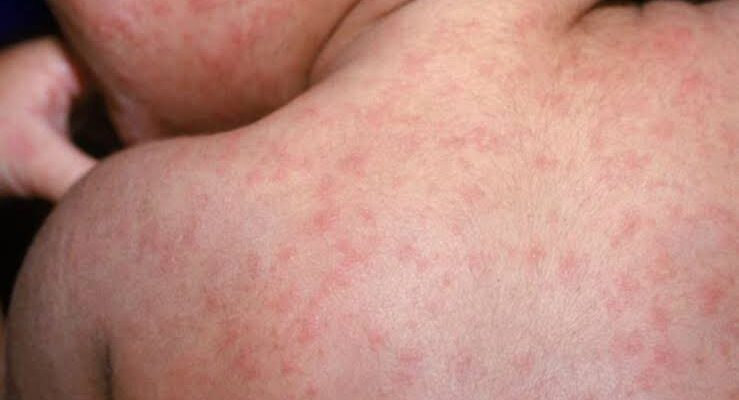Overview
Measles, or rubeola, is a highly contagious viral infection caused by the measles virus. It spreads through respiratory droplets when an infected person coughs, sneezes, or breathes. Measles primarily affects children but can occur in unvaccinated individuals of any age. Despite the availability of an effective vaccine, measles remains a significant public health concern in areas with low vaccination rates.
The symptoms of measles usually appear 10 to 14 days after exposure and begin with fever, cough, runny nose, and conjunctivitis (red, watery eyes). These are followed by the appearance of small white spots inside the mouth, known as Koplik spots, and a distinctive red rash that starts on the face and spreads downward to the rest of the body. Measles can weaken the immune system, making individuals more susceptible to secondary infections such as pneumonia, diarrhea, or encephalitis, which can lead to serious complications or even death.
Treatment for measles primarily focuses on relieving symptoms and preventing complications. Supportive care includes rest, hydration, and fever management with medications like acetaminophen or ibuprofen. Vitamin A supplements are often recommended, as they can reduce the severity of symptoms and lower the risk of complications, especially in children. Antibiotics may be prescribed for bacterial infections that develop as a result of weakened immunity during measles.
The best way to prevent measles is through vaccination. The measles-mumps-rubella (MMR) vaccine is safe and highly effective, providing lifelong immunity in most cases. Public health initiatives promoting widespread vaccination have significantly reduced measles cases globally, but outbreaks still occur in areas where vaccine coverage is insufficient. Early detection, isolation of infected individuals, and community immunization are essential to controlling the spread of measles and minimizing its impact.
Table of Contents
When to See a Doctor
While measles often resolves with supportive care, certain signs and circumstances require immediate medical attention to prevent complications and ensure proper management.
Signs to see a doctor:
- High fever lasting more than three days. Persistent or very high fever (above 104°F or 40°C) could indicate severe infection or complications and warrants medical evaluation.
- Difficulty breathing or persistent coughing. If the infected person has trouble breathing, rapid breathing, or a severe, prolonged cough, this may signal complications like pneumonia and requires prompt attention.
- Unusual symptoms such as confusion or seizures. These symptoms could indicate encephalitis, a rare but serious complication of measles, and should be addressed immediately.
- Severe diarrhea or dehydration. If the patient is unable to retain fluids due to vomiting or diarrhea, they may need medical intervention to prevent dehydration.
- For infants, pregnant women, or immunocompromised individuals. These groups are at higher risk for severe measles complications and should seek medical care at the first sign of symptoms.
Seeing a doctor early ensures that symptoms are managed effectively and complications are treated promptly. It also helps prevent the spread of the infection to others, as measles is highly contagious during its active phase.
What Type of Doctor to Seek
If you suspect measles or exhibit symptoms such as fever, rash, and respiratory discomfort, the first point of contact should be a primary care physician or a pediatrician for children. These doctors are equipped to diagnose measles based on your symptoms, medical history, and physical examination. In some cases, they may confirm the diagnosis through a blood test or a throat swab. They will also guide you on managing the symptoms, preventing complications, and minimizing the risk of spreading the virus to others.
For more severe cases or when complications arise, such as pneumonia or encephalitis, you may be referred to a specialist, such as an infectious disease specialist or a pulmonologist. If the patient is pregnant, an obstetrician should also be involved to ensure the safety of both the mother and baby. Consulting the appropriate healthcare professional ensures comprehensive care and timely management of measles and its associated risks.
What to Expect from Your Visit to a Doctor
When you visit a doctor for suspected measles, the appointment will typically begin with a discussion about your symptoms, medical history, and possible exposure to individuals with measles. The doctor will ask about the onset and progression of symptoms, such as fever, rash, and respiratory discomfort. They may also inquire about your vaccination history or any recent international travel, as measles outbreaks are more common in certain regions.
The doctor will perform a physical examination, focusing on identifying the characteristic signs of measles, such as Koplik spots inside the mouth and the pattern of the rash. In some cases, they may recommend a blood test or a throat swab to confirm the diagnosis. If measles is diagnosed, the doctor will provide a treatment plan, which may include fever management, hydration advice, and vitamin A supplementation. If complications like pneumonia or ear infections are suspected, additional tests or treatments may be suggested. This visit ensures that symptoms are properly managed and that steps are taken to prevent the spread of the infection to others.
Measles Treatment Options

Image Source: unsplash.com
While there is no specific cure for measles, managing its symptoms effectively is crucial to preventing complications and ensuring a smoother recovery. Measles symptoms typically resolve within 7 to 10 days, but the following treatments can help alleviate discomfort and support the healing process:
- Stay hydrated. Drinking plenty of water or fluids is essential to prevent dehydration, especially if the patient has a fever or diarrhea. Electrolyte-rich drinks like oral rehydration solutions can also be beneficial.
- Use fever-reducing medications. Medications like acetaminophen (Tylenol) or ibuprofen can help lower fever and relieve body aches. Avoid giving aspirin to children under 16 years old to prevent Reye’s syndrome, a rare but serious condition.
- Reduce light exposure. For individuals experiencing light sensitivity, keeping the room dim and limiting exposure to bright light can provide relief. This is especially important for young children.
- Clean the eyes gently. If the patient develops eye discharge or crusting, gently wipe the eyes with a clean cloth soaked in warm water to keep the area clean and reduce irritation.
- Use a humidifier. Instead of cough syrup, a humidifier can help soothe a dry throat and alleviate coughing caused by measles. This also helps maintain moisture in the air, making breathing easier.
- Provide vitamin A-rich foods. Offering foods like carrots, sweet potatoes, and spinach, which are rich in vitamin A, can help strengthen the immune system and reduce the risk of complications. For children with severe cases, vitamin A supplements may be recommended by a doctor.
Managing measles effectively involves addressing symptoms while ensuring the patient receives plenty of rest and care. By following these recommendations and consulting a healthcare provider as needed, individuals with measles can recover safely and minimize the risk of complications.
Measles Prognosis
The prognosis for measles improves significantly with proper symptom management and supportive care. Each treatment option contributes to alleviating discomfort, reducing complications, and promoting recovery. Here is an overview of the expected outcomes for each approach:
- Stay hydrated. Maintaining adequate hydration prevents dehydration, especially during fever or diarrhea, supporting overall recovery and reducing the risk of severe complications like electrolyte imbalance.
- Use fever-reducing medications. Medications such as acetaminophen or ibuprofen effectively control fever and body aches, improving patient comfort and allowing the immune system to focus on fighting the infection.
- Reduce light exposure. Limiting bright light relieves sensitivity and prevents additional strain on the eyes, promoting comfort during recovery.
- Clean the eyes gently. Regular cleaning of the eyes prevents secondary infections and soothes irritation caused by discharge, supporting quicker healing of the eyes.
- Use a humidifier. Humidifiers help alleviate coughing and maintain respiratory comfort, reducing throat irritation and supporting better sleep during recovery.
- Provide vitamin A-rich foods. Foods and supplements rich in vitamin A enhance the immune response, lower the risk of complications like pneumonia, and support faster recovery, particularly in children.
With timely and consistent treatment, most measles cases resolve without long-term effects. These approaches not only improve the patient’s recovery experience but also reduce the likelihood of severe complications, ensuring a positive outcome for most individuals.


